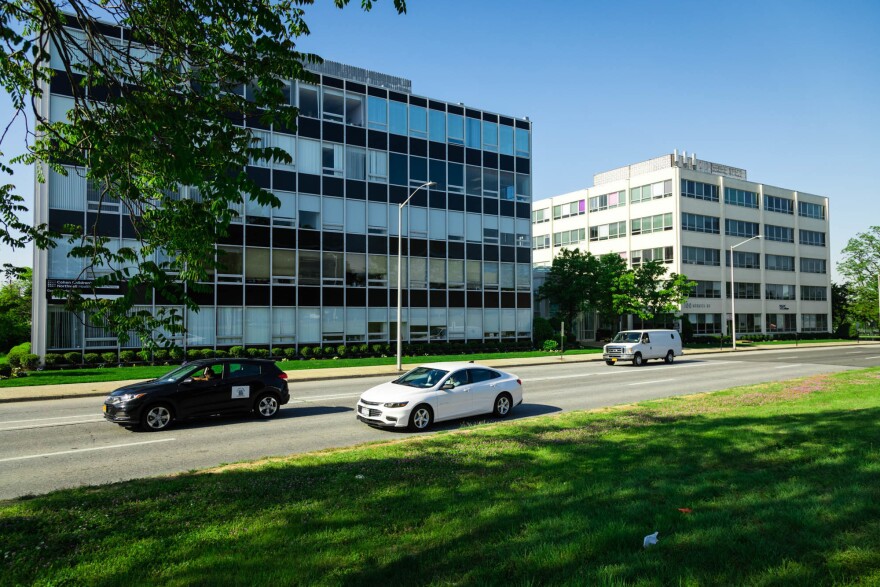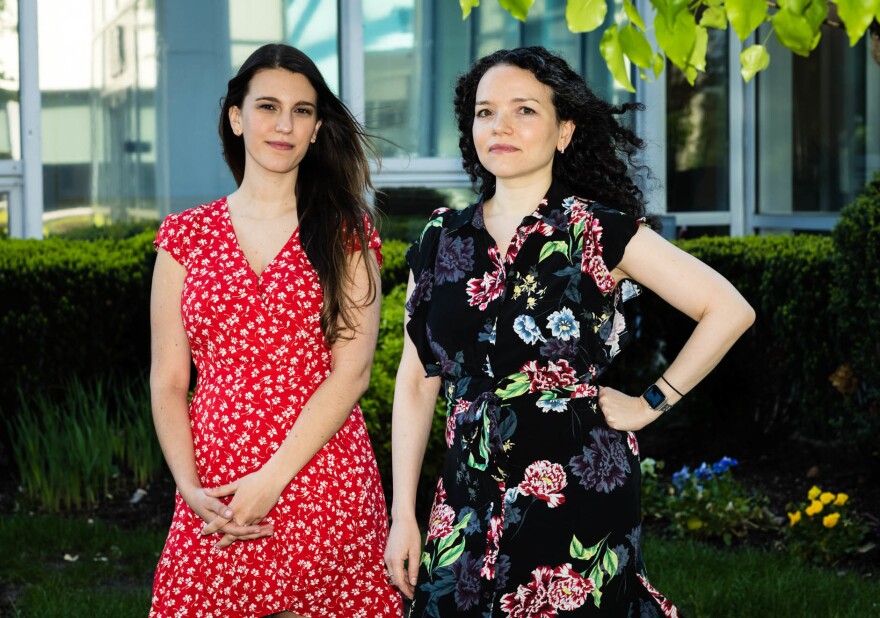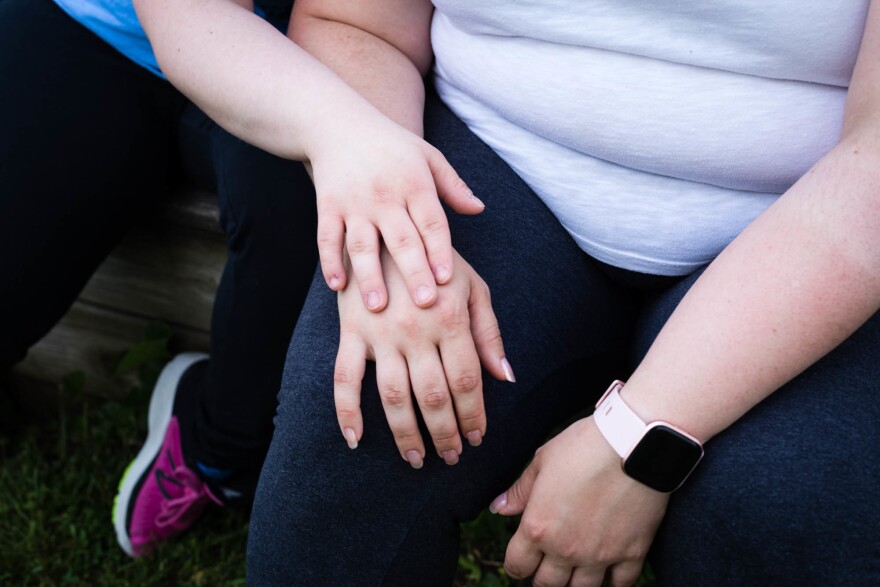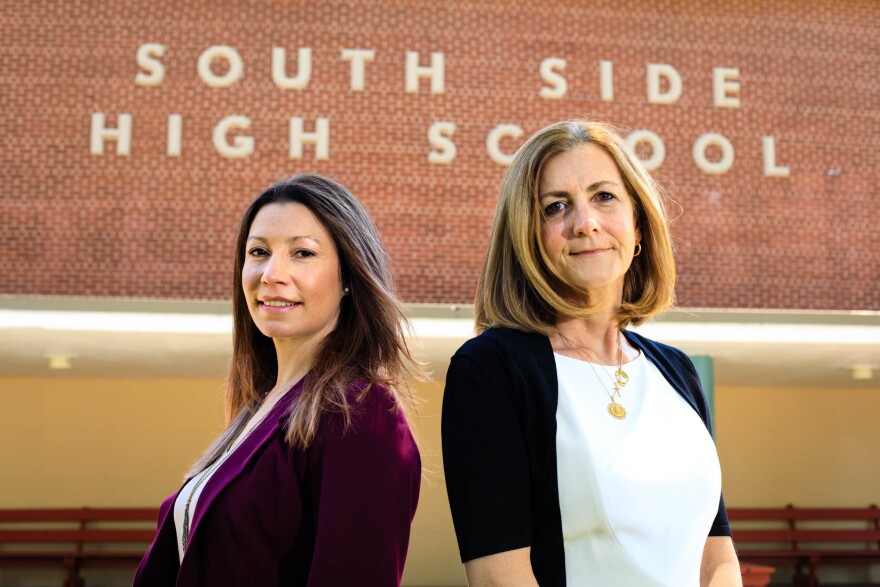Updated June 11, 2021 at 11:30 PM ET
In 2019, the Rockville Centre school district in Long Island, N.Y., was shaken by a string of student deaths, including the suicides of a recent graduate and a current student.
"When you get these losses, one after the other, you almost can't get traction on normalcy," says Noreen Leahy, an assistant superintendent at the school district. "You can't get traction on kids functioning on a day-to-day basis in a school setting."
To Leahy, the student suicides were a symptom of a children's mental health crisis that had been brewing for years. She had observed a concerning uptick in depression, anxiety and suicidal ideation among students. Her school district had a team of mental health professionals, but Leahy says they couldn't provide the kind of long-term care many students needed.
"Remember, psychologists and social workers and counselors in school districts are there to make sure kids are learning," says Leahy. "We're not hospital wards. We don't do psychotherapy. So it's very limited what we can do for these students."
She says she saw an urgent need to connect students to mental health care quickly and easily, and the 2019 tragedy drove her to find a way to make that happen.
Her vision ultimately led to the formation of a unique partnership between several Long Island Island school districts and the nearby children's hospital, Cohen Children's Medical Center, which is part of the Northwell Health system. That partnership provides prompt access to mental health care services for students and includes ongoing support for school staff for dealing with kids' mental health, creating a mental health safety net for children and families in the area that didn't exist before.
The heart of it is a new behavioral health center focused on serving kids in the community, which the hospital opened in January 2020. Students are evaluated by the center's child psychiatrist and mental health counselor, who start and continue treatment till a child can be connected to long-term care in the community.
Mental health experts point to this school-hospital partnership as an effective model — one that meets a growing and urgent need to help children get mental health treatment and avoid unnecessary hospitalization.
"It's a real step forward," says Glenn Thomas, a clinical psychologist at Nationwide Children's hospital in Columbus, Ohio. "So many kids and families slip through the cracks because of a lack of resources."
'I just wish there was a place to send these kids'
The concerning rise in mental health issues noticed by school administrators mirrors national trends. Roughly 1 in 5 U.S. children meet criteria for a mental health disorder, and the rate of suicide attempts among youth has risen over the past decade, according to the U.S. Centers for Disease Control and Prevention.

Around the country, most kids who have mental health issues don't get treatment. There's a shortage of providers who work with children and it can take months to get an appointment.
"The wait times on an average to see a mental health specialist on an emergency basis is somewhere between two to three months, and for regular basis is up to 12 months, which is an unacceptable wait time," says Dr. Ujjwal Ramtekkar, a child and adolescent psychiatrist at Nationwide Children's Hospital.
Without timely access to care, many kids end up with worsening symptoms and eventually land in a hospital emergency department, "as the fastest way to either avert [a mental health] crisis, or as the fastest way to get some kind of mental health evaluation," adds Ramtekkar.
Even when they do get an evaluation, he says, "there's no place for them to go and connect."
And schools in Long Island have seen the consequences.
"It sort of creates this ping pong effect," says Tina Smith, executive director of special education at Oceanside Public Schools in Long Island.
It's common to see students go to the ER only to be discharged soon after and return to school without a plan for follow-up care, she says.
"And then the problems start to spiral again out of control," Smith says, "and then they're sent back to the hospital [ER]."
It was with these worries in mind that after the student suicides in 2019, Leahy began raising her concerns with colleagues, school board members and other parents, including Gina-Marie Bounds, who happened to work at Cohen Children's.
Bounds, who has three children of her own, had also been shaken by the suicides, and she recalls her conversation with Leahy.
"I can actually remember the exact moment," Bounds says. "She said to me, 'I just wish there was a place to send their kids. I wish we could just hang up, like, a shingle on a storefront and send these kids there.' I thought back to myself and said, 'I think I can do that.'"
Bounds took the idea to the head of emergency child psychiatry and hospital leadership at Cohen's and they got to work. Leahy spread the word to neighboring school districts, who were also dealing with the same problems, and convinced them to come on board. Several months later, the mental health center opened its doors.

This couldn't have come at a better time, says Leahy. At a time when many large hospitals around the country saw a surge in the number of kids in mental health crises in their emergency departments, the new behavioral health center reports the opposite trend. The number of mental health visits to the emergency room by students from these school districts declined by at least 60% in 2020 compared to the previous year.
School administrators also say the health center has played a critical role in prevention by promoting the emotional wellbeing of students, families and school staff. School and health center staff meet twice a month via Zoom to check in and brainstorm ideas for how to address emerging health and wellness concerns of staff and families.
Getting kids the right help at the right time
The goal of the new health center is to provide kids with care as soon as symptoms emerge.
The center is staffed by a child psychiatrist, a mental health counselor and a medical assistant. It's located next to a pediatrician's office and within a few miles of the school districts it serves.
When a child first arrives, the child is evaluated to determine if they need to be hospitalized.
"Most kids don't need that," says Dr. Vera Feuer, Northwell Health's associate vice president for school mental health, who helped create the center and now oversees it. "Most kids need outpatient care."
And the center starts that care right away — medication and/or therapy, depending on what each child needs — to stabilize the child and prevent worsening of symptoms, and connect them to ongoing care with a provider in the community.
In January 2021, a local resident, Tara, found herself calling the health center to make an appointment for her 17-year-old sister, who had been struggling with irregular sleep patterns and panic attacks for months.
Tara had recently become her sister's legal guardian. We're not using their last names and only using the sister's middle name — Jasmine — to protect their privacy.
Jasmine says she felt suffocated during her panic attacks.
"It felt like I was running, like my heart got really fast, and like I was being put in a little tiny box," she says.
Jasmine and Tara met with the behavioral health center's mental health counselor, Ariana Metalia, who told them that the teenager was struggling with anxiety.
The follow-up sessions were helpful for Jasmine, who learned about the importance of speaking with a trusted friend or adult any time she felt triggered. And they also helped Tara learn to recognize the symptoms of anxiety and understand that her sister's mental health issues were triggered by past trauma.
"I learned how [Jasmine's] anxiety can be mood swings, it can be irritability, it can be sleep patterns, the way you eat," Tara says. "So that was very good to know, because then you get to learn how to cope with that."
The clinic helped Jasmine get connected with a nearby psychologist who she now sees for weekly therapy sessions, adds Tara.
"We try to create an environment where somebody feels safe talking to us about their deepest feelings and concerns," says Dr. Zoya Popivker, the health center's child psychiatrist.
Metalia says she works closely with Popivker to assess and treat children and also reassure caregivers, saying: "'It's a great thing that you're catching this ... right now. This is the plan that we have in place. And we will continue seeing your child until they are linked [with ongoing care]. We are not going to leave your side."
Removing barriers to care for the most vulnerable
The new health center provides an important safety net for kids who might otherwise fall through the cracks, like 17-year-old Alyssa Gibaldi, who was refused care by other mental health providers because of her disability.
Alyssa attends Oceanside High School and is extremely social, says her mother Jennifer.
"She's like the mayor of the school; everybody knows her," Jennifer says.
Alyssa has Down syndrome and the pandemic upped her anxiety. Last fall, she became catatonic and went into what Jennifer describes as a "zombie-like state."
"She couldn't talk. She couldn't move. She couldn't speak. She couldn't feed herself," Jennifer says.
On several occasions, Jennifer called 911. Alyssa was transported in an ambulance to the ER and was hospitalized. After her neurologists ruled out seizures and other conditions, they suggested Alyssa see a psychiatrist.
But Jennifer says Alyssa was turned down repeatedly by providers saying they didn't take her insurance or that they didn't work with kids with disabilities.
That's when Jennifer reached out to the school nurse, who referred the family to the new behavioral health center. The center's child psychiatrist, Popivker, reviewed Alyssa's medical records and prescribed medications for depression and anxiety.
Jennifer says they got the meds on a Saturday morning, "and by Saturday night, she was out of the catatonic state. Ever since then, she's been coming back to us, like her personality came back."
Alyssa continued to go to the behavioral health center for several months, until they were able to transition to a psychiatrist who works with kids with disabilities.
"They were such a lifesaver for us. We can never thank them enough," Jennifer says.
The case for school-hospital partnerships
It makes sense for children's hospitals to partner with schools because that's where kids spend most of their day, says Nationwide's Ramtekkar.
School staff often know their students better than anyone else and can spot early signs. It's why schools in many parts of the country have been working to forge partnerships with nearby mental health care providers.

In some parts of the country, these partnerships have led to embedding mental health providers within schools. In Franklin County, Ohio, children across 70 schools can receive mental health support from 14 school-based clinics staffed by Nationwide Children's Hospital. Each clinic employs an advanced practice nurse and behavioral health therapist, with a dedicated hospital-based child psychiatrist available to all sites.
School districts and hospitals from other parts of the country — including Florida, Illinois, Massachusetts and North Carolina — have reached out to the staff at Cohen Children's in New York to explore the possibility of creating similar hospital-school partnerships in their areas.
The need for such partnerships is even greater now, Ramtekkar adds, because the pandemic has further taxed an already stretched safety net.
"It's truly a double jeopardy, because not only has the pandemic worsened the mental health of youth who have pre-existing mental health concerns, but also it has led to the rise in new cases," he says.
But such partnerships still depend on mental health care resources in the communities they serve. According to a 2019 study, 70% of counties don't have a single practicing child psychiatrist.
In places where the shortage of providers is more dire, telehealth can help expand access to care, says Ramtekkar at Nationwide Children's. But rural broadband issues can limit access and there are some conditions for which telehealth may not be as effective as in-person services.
Even in Long Island, providers are feeling the strain caused by the increased need for mental health services during the pandemic.
Metalia says lately, the health center has been seeing as many as a hundred children every month, and it's been taking longer to connect kids to community-based providers.
"We're trying to get them linked to therapy, but everybody's so full," says Metalia, who spends a significant amount of her time building relationships with providers in the community who can provide the long-term care many of the center's patients need.
In recent months, she has tried to convince pediatricians to provide follow-up mental health care for less-severe cases, assuring them they can consult with Popivker when they need additional support. In other cases, she has had to persuade mental health providers who only see patients who pay out of pocket — or aren't in network with certain health insurance plans — to take over some of her patients.
'It's just a real relief'
For Noreen Leahy, the assistant superintendent at Rockville Centre in Long Island, the quest to address her district's growing challenges with student mental health has been well worth the effort.
Sharing a behavioral health center across multiple school districts leads to both better collaboration and cost savings. The price her district pays for the services is less than the cost of one full-time staff member, and the state chips in to cover part of that.
"It is a bargain based on what we're getting back," Leahy says. "It's been a complete Godsend. It's just a real relief [on] many levels. And most importantly, it's helping kids."
Cohen Children's will add a new behavioral health center this summer, expanding to 14 school districts. At that point, about 60,000 students in Long Island will have access to immediate mental health support should they need it.
This story is part of a reporting partnership that includes NPR, Illinois Public Media and Kaiser Health News. Nationwide Children's Hospital, mentioned in this story, is a financial supporter of NPR.
Copyright 2021 NPR. To see more, visit https://www.npr.org. 9(MDIwNjQ2MTYzMDE0NDM1NTQ0OThlYjEzMg001))



